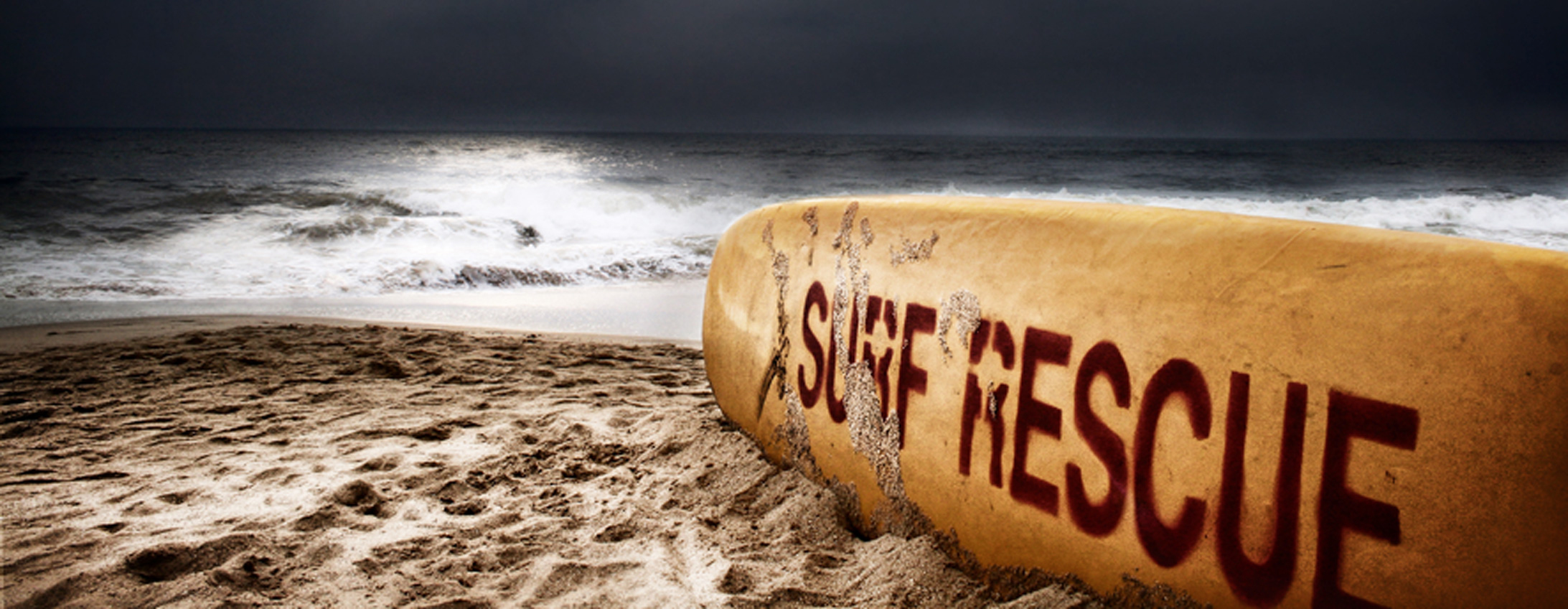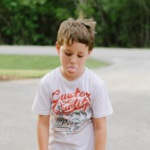
07 Jan A Scare In The Surf
Amanda Hampson recalls the moment when the sea turned from playground to predator for her family.
We weren’t alarmed, just a little uneasy.
It was the end of a long, hot day when we took our children to the beach for a quick swim. Even as we arrived, the wind began to shift, making the water choppy. A veil of cloud drifted across the sky, dimming the blue to grey. The children swam between the flags for a time, but they had borrowed a friend’s surfboard and wanted to try it out, so, for the first time ever, we let them swim just outside the flags. Last swim, we said, then home for dinner.
Within minutes, they had drifted towards the south end of the beach, but they were still in the shallows and appeared safe enough. We sat on the beach chatting, but never taking our eyes off them. We didn’t grow up near the sea and neither of us is a strong swimmer, so we’re always vigilant.
Minutes later, the children were almost in the corner of the bay, the area known as ‘Kiddies Corner’. They were a fair way from the fl ags by this time and all of a sudden they seemed out of their depth. We weren’t alarmed, just a little uneasy.
She was caught in a rip.
“I’ll call them in,” I said, getting up and wandering down to the water’s edge to signal to them. By the time I reached the shallows, they were even further out. My voice was lost over the crash of the surf, but they saw my signal straight away; my son had the board and came in on his belly on the next wave. I signalled more urgently to my daughter. Why wasn’t she coming in? She was nearly 12 and a good swimmer, but she didn’t appear to be even trying to come in. In fact, she was moving away at a frightening speed. Suddenly I read her expression – she was caught in a rip.
Panic rising, I plunged into the water. I had to help her in, but as I pushed into the water, the waves forced me against the rocks at the end of the beach. I couldn’t bear to take my eyes off her. Each time a wave broke, she was further out. Within seconds, she was four waves away. A pale, frightened little face appeared on the crest of each dark wave. She was conserving her energy and raising her arm to signal, just as she’d been taught.
I was powerless to help her.
As I forced myself on, battling against each wave, I was struck by the realisation that I was powerless to help her. I had no idea what to do. I was acting purely on instinct. A desperate mother can be dangerous. I had to think clearly. In the back of my mind was a news item, from only days earlier, about a family who had all drowned trying to save each other. In that moment I knew that I was about to become part of the problem. I turned and stumbled back towards the beach.
“Please help us! Help!”
Her father was right behind me. I screamed at him, my cries obliterated by the crash of the surf. He’s not a swimmer and is the last person who should attempt a surf rescue. We stood for a moment looking at each other helplessly. His face reflected all of my emotions: horror, disbelief, terror…
He turned and ran down the beach towards the surf patrol. I stood in the water waving frantically towards the surf patrol. “Please help us! Help!”
When I turned back towards the sea, she was gone. I couldn’t see her at all. I was almost paralysed by fear and indecision. Should I again attempt to go in or should I wait for help?
I caught a fl ash of red and gold to my right. A man was running along the rocks beside the sea pool, with a flotation belt. He dived into the sea and disappeared behind the breakers. Over the breaking wave I could see another man on a surfboard. Finally, I caught a glimpse of my daughter’s pink rash vest in the distance. For minutes at a time they all disappeared from view.
This is how we lose our beautiful children
Still not sure how this story would end, I stood helplessly in the surf, crushed by the dreadful realisation that this is how it happens. This is how we lose our beautiful children. The sea so swift and silent; one minute a sparkling blue playground, the next a grey predator determined to drag its prey beyond reach. A child means no more to the sea than a shell it licks from the beach, snatched in a moment to drift forever in its lonely depths.
I don’t know how long we waited; perhaps 10 minutes. Ten achingly long minutes before a lifesaver appeared with our daughter safely on his board and delivered her to the beach. Overwhelmed, I threw my arms around this stranger who had restored our child to us, sobbing my thanks, grateful beyond words. Still not sure how this story would end, I stood helplessly in the surf, crushed by the dreadful realisation that this is how it happens. This is how we lose our beautiful children. … A child means no more to the sea than a shell it licks from the beach, snatched in a moment to drift forever in its lonely depths.
Less than an hour after we had arrived, we left the beach, still intact as a family, but silent, and shocked by the possibility that it could have been otherwise.
Over the next few days we comforted and calmed our daughter as she relived the experience in her dreams. I cried in private for what might have happened; tears for every parent who has lost a child to that vast ocean; tears for every parent who has gone to the beach for a swim and come home without a child. From now on, we’ll always swim between the flags. We truly understand the risks of doing otherwise. ■



